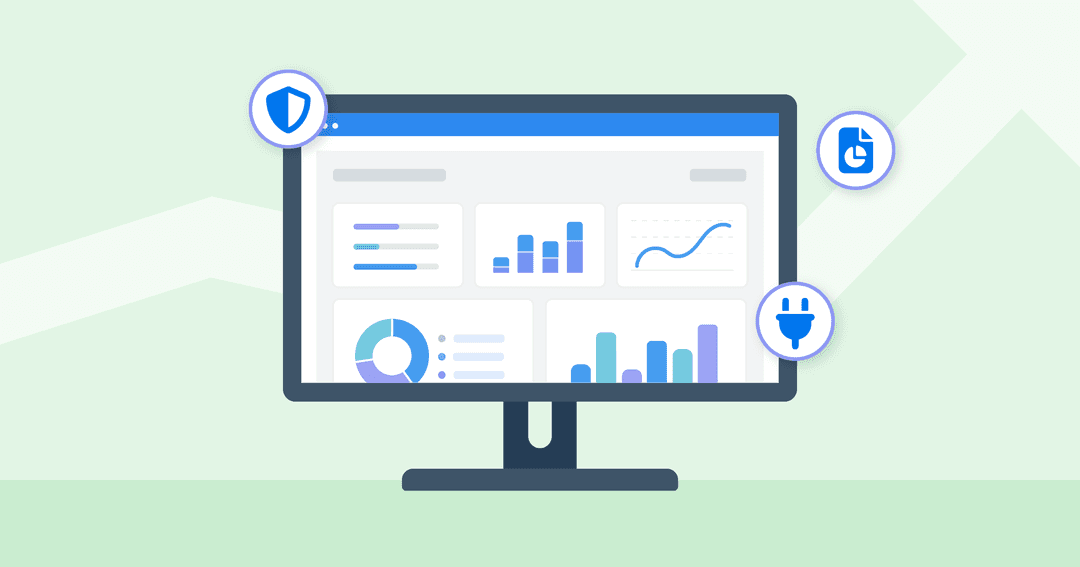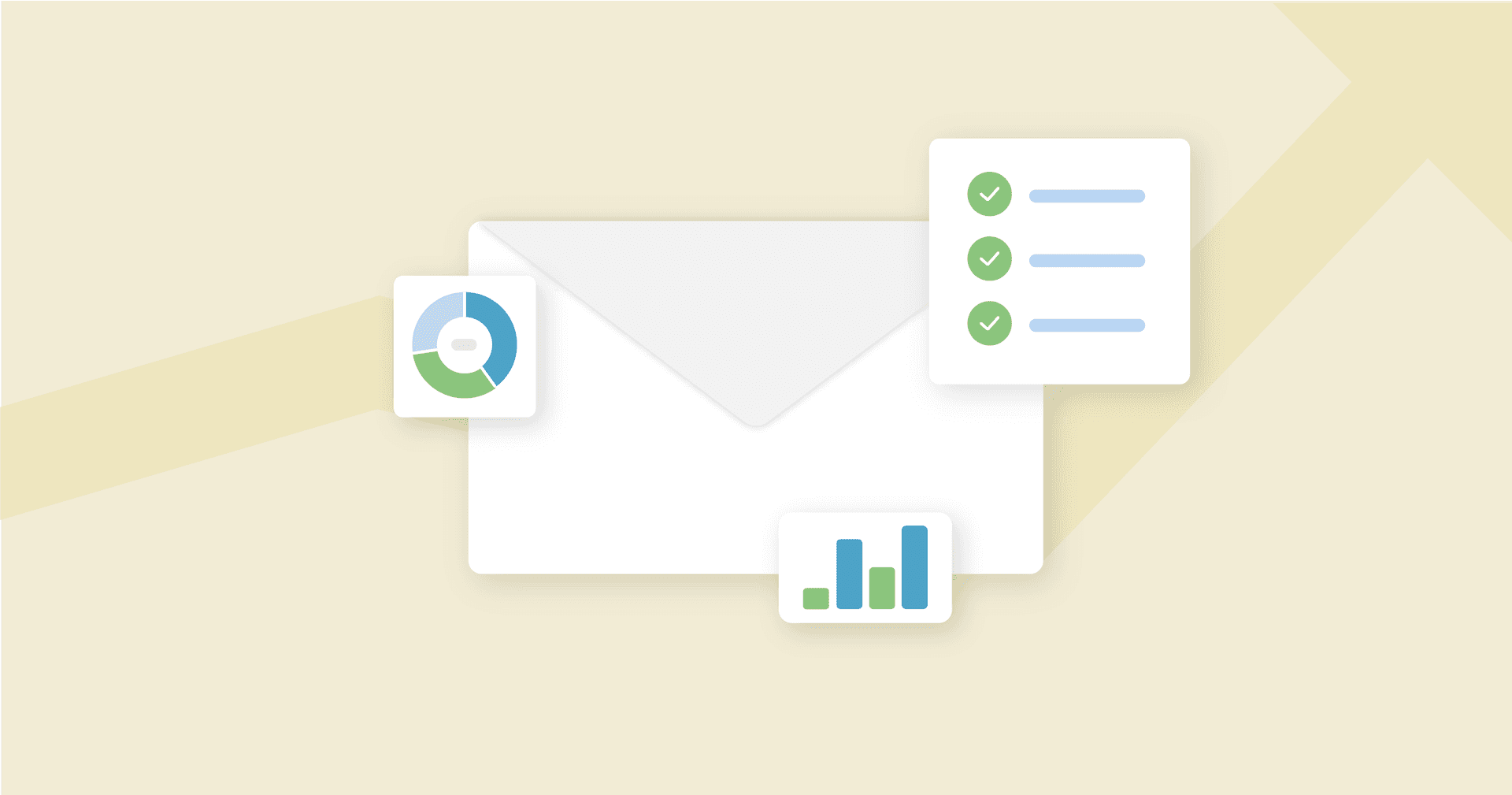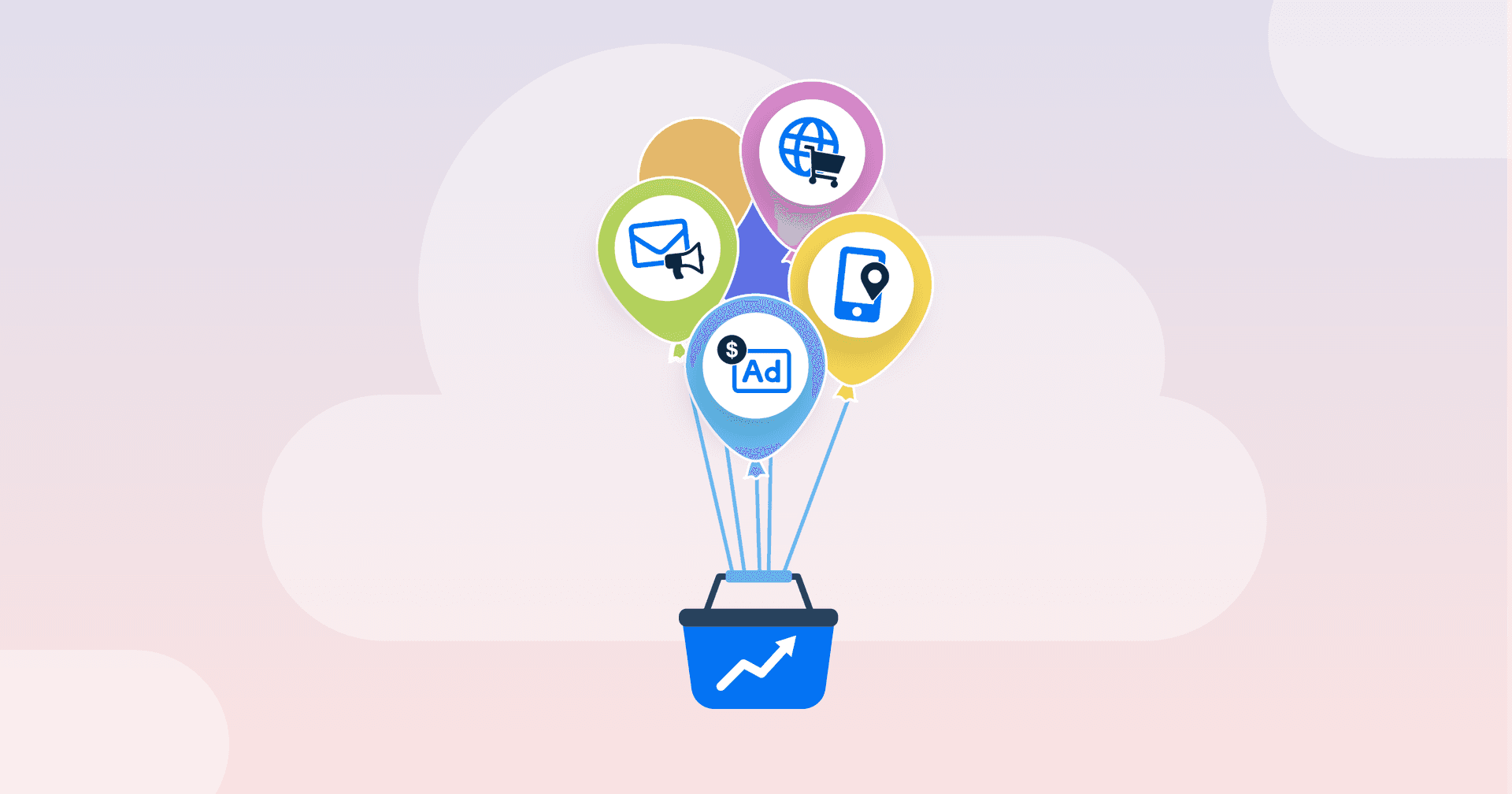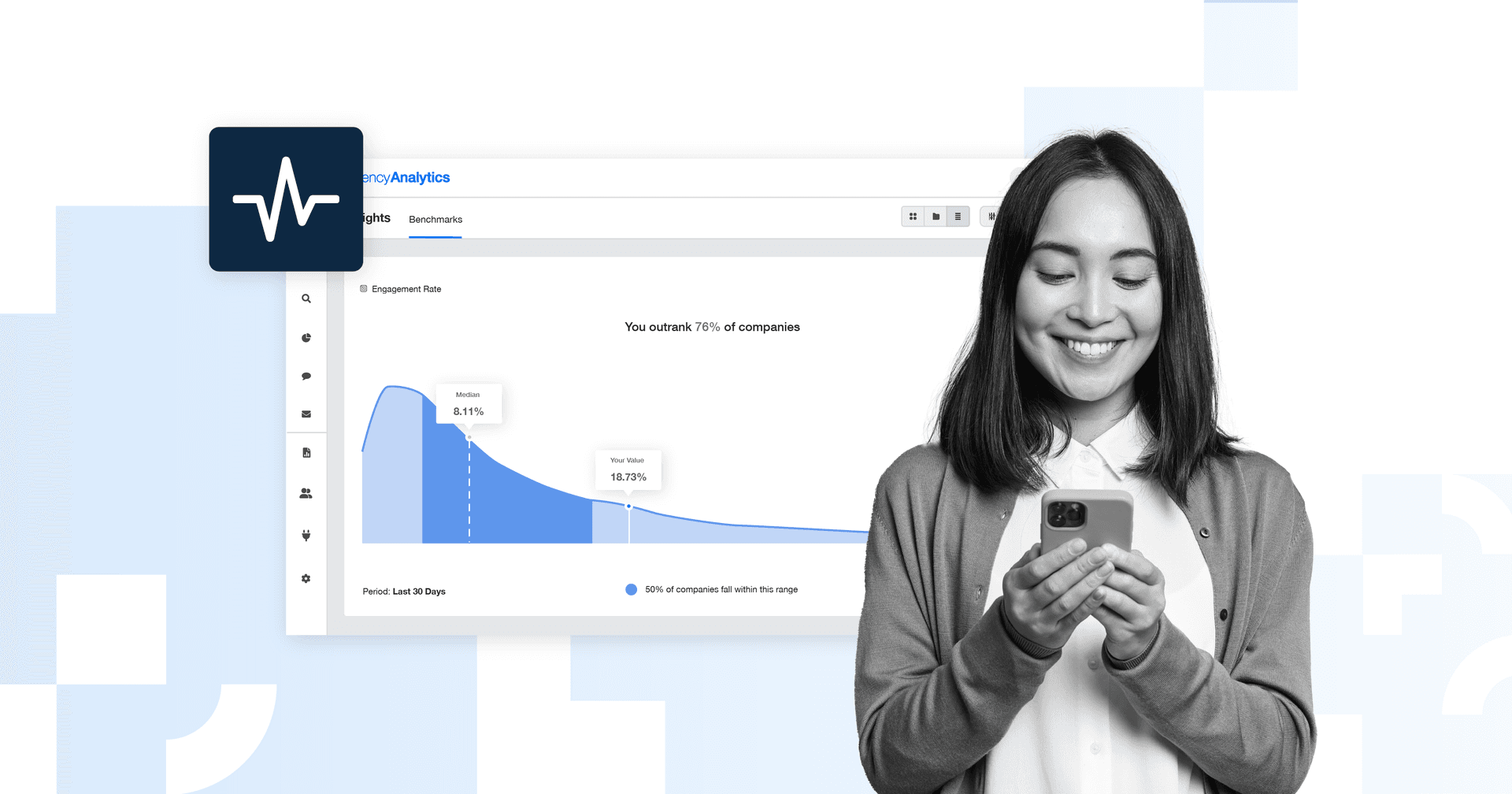Table of Contents
QUICK SUMMARY:
A marketing analytics platform gives agencies access to critical data and insights for informed decision-making. Essential for optimizing marketing efforts, it enhances understanding of customer behaviors and drives business growth. This article guides agencies through selecting a platform that aligns with their specific needs, budget, and scalability, ensuring a perfect fit for both current and future requirements.
Let’s be honest. Researching marketing analytics platforms—or any software solution for that matter—brings up a whole gamut of emotions.
You’re probably feeling excited and optimistic about bringing innovation and improvement to your marketing agency. But at the same time, the choices are overwhelming. Cost is always a concern. You might be skeptical about whether certain platform options will truly address your team’s specific needs. And you may be confused or even frustrated by the complexity of comparing features across all of the potential options.
Breathe in, breathe out, and get ready to take the pressure off!
This article hand-delivers you the must-haves to evaluate solutions, narrow down your options, and pick the best marketing analytics tool for your agency.
Let’s go.
Why Marketing Analytics Matter
The days of ‘going with your gut’ when it comes to marketing strategies are long gone. We all know it’s about being data-driven. But it never hurts to be reminded of why marketing analytics matter in the first place.
Marketing analytics is the backbone of effective digital marketing strategies. It provides insights and data your agency needs to make informed decisions. It helps optimize marketing efforts and provides clarity in terms of understanding your customers. Pair the right analytics with cross‑channel marketing agency tools for execution.
Marketing analytics—when used wisely—drive business growth.
Importance in Today’s Competitive Marketplace
By leveraging analytics, marketers optimize their campaigns for better engagement, higher conversion rates, and increased ROI. This modern, data-driven approach not only allows for more efficient allocation of resources, but also fosters a deeper connection with customers through personalized experiences.
And then there’s the real-time decision-making and predictive analysis capability. Being able to react and make decisions based on what the data says today is huge. But being able to make educated decisions that impact future performance creates a winning, proactive approach.
Analytics empower businesses to stay ahead of the curve in a competitive, rapidly evolving marketplace.
The Basics of Marketing Analytics Platforms
Marketing analytics are clearly important. But they also present a pretty enormous challenge in that there’s JUST SO MUCH available.
That’s where the best marketing analytics platforms shine. These tools are all about helping you effectively manage, visualize, interpret, and use your marketing data in meaningful ways.
Definition and Core Functionalities
At its core, a marketing analytics platform is a central hub that not only consolidates all your marketing data from various sources, but also makes sense of it in a way that's insightful and actionable for both your agency and your clients.
The right marketing analytics platform should help your agency accomplish the following:
Data Collection and Integration | Data needs to be gathered from many channels, like PPC, websites, social media, SEO, email, and more. This data is then integrated to provide a holistic view of your clients’ marketing landscapes. |
Performance Measurement | Visualize your integrated data and use it to monitor the performance of marketing campaigns across your clients’ different channels. This includes tracking metrics like engagement rates, conversion rates, click-through rates, and ROI to understand what’s working and what isn’t. |
Customer Insights | Track and monitor the data over time to help you understand customer behavior, preferences, and trends. By analyzing the data, your agency will pick out patterns and preferences, which helps in targeting and personalization. This ultimately enables you to deliver enhanced marketing experiences. |
Marketing Optimization | Understanding which strategies and tactics are most effective for your clients lets you optimize your marketing efforts, allocate your resources more efficiently, and maximize the impact of your marketing budget—it’s all about informed, strategic decision making. |
ROI Analysis | Assessing the return on investment of your agency’s marketing activities is crucial to ensure you’re delivering value on your marketing spend. Proving your impact and building trust with your clients is the key to retaining them. |
Client Reporting | Gaining insights and optimizing your marketing strategies for your clients is key, but your platform also needs to provide easy ways for you to share performance updates with your clients. Consistent, reliable reporting proves your agency is making an impact and it’s ultimately worth the spend. |
Predictive Analysis | Tracking and visualizing data over time lets you forecast future customer behavior, sales trends, and market dynamics. This helps in strategic, proactive planning and staying ahead of the curve. |
How It Fits Into the Marketing Ecosystem
Is accomplishing all of the functionalities above even possible without a great marketing analytics platform? Sure it is. But it’s going to cost you a whole lot of time and effort. And it’s certainly going to make scaling your agency more of a challenge.
When a client hires you to help them win at marketing, would you rather spend your time manually pulling, organizing, and analyzing all of their marketing analytics? Or, would you prefer to automate most of that process so you have the insights and the time you need to do more of what really works to drive your clients’ marketing performance?
Of course, it’s a rhetorical question.
Impress clients and save hours with custom, automated reporting.
Join 7,000+ agencies that create reports in under 30 minutes per client using AgencyAnalytics. Get started for free. No credit card required.
Already have an account?
Log inKey Components of a Great Marketing Analytics Platform
As you’re exploring marketing analytics platforms, it’s easy to get caught up in all the bells and whistles. The following are the features that really matter though; the ones that separate a good platform from a great one.
Data Integration Capabilities
If yours is like most digital marketing agencies, you’re leveraging dozens of platforms to handle marketing work for your various clients, and Google Analytics alone just won't do.
An effective reporting platform needs to pull together and present data from across all these sources, including web analytics tools, social media platforms, organic search, and ad networks... and it needs to do it with ease.
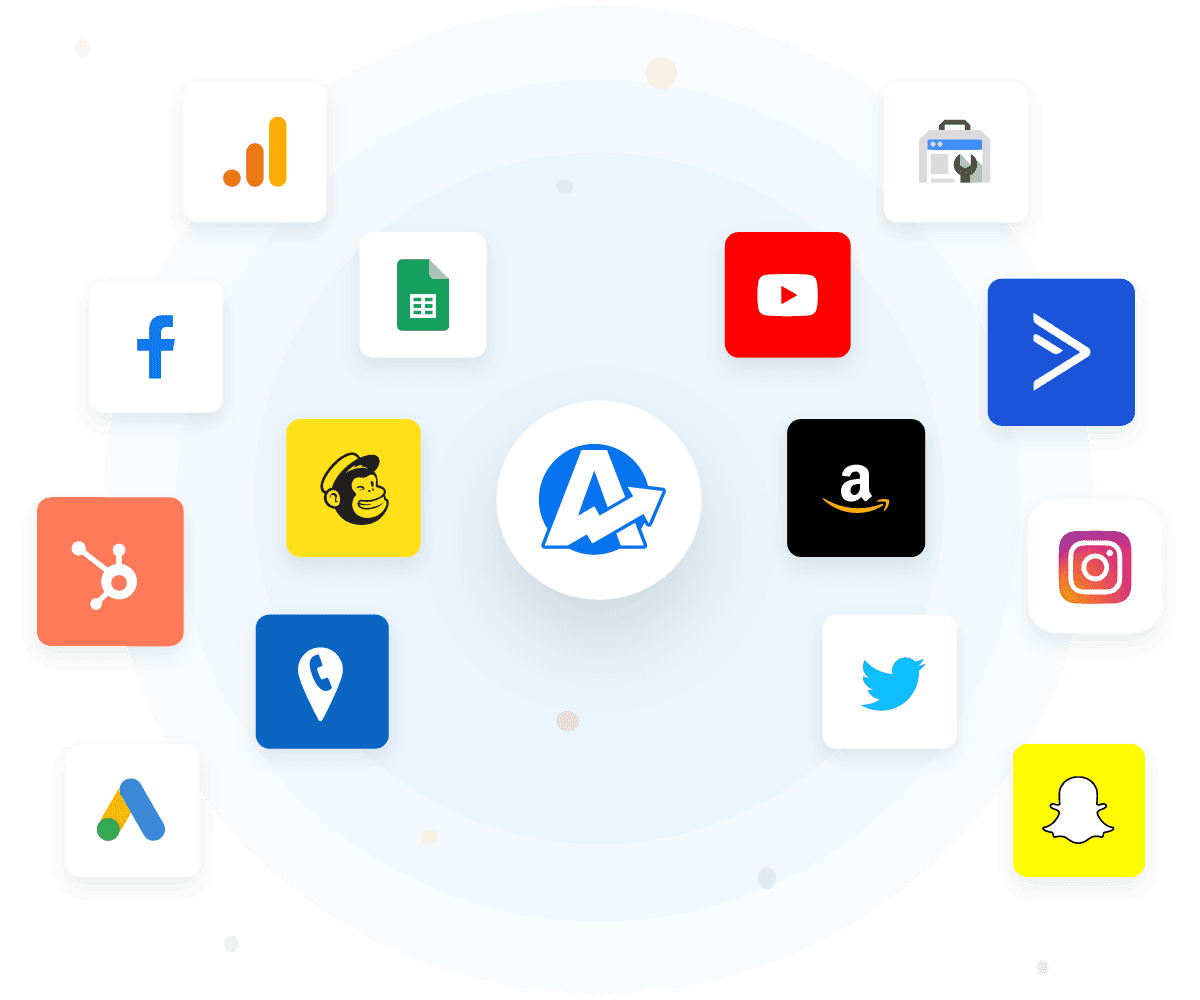
Why Integrated Data Is Crucial
Having your full data load in a single platform instead of accessing it from many individual channels not only saves you a lot of time, but also it provides a more complete view of overall performance. You get to clearly see how all the marketing pieces are functioning as a whole; and how pulling one marketing level impacts another.
Compatibility With Existing Systems
While each of your agency’s individual clients may only use a handful of platforms for their marketing, not every client uses the same tools. And as your agency grows and brings on new clients, the total number of tools you’ll need data from across your entire client base is sure to grow.
The right marketing analytics platform for your agency should offer integrations that are compatible with your existing systems that can unify marketing analytics, but also plenty of options across various marketing categories to accommodate future growth potential.
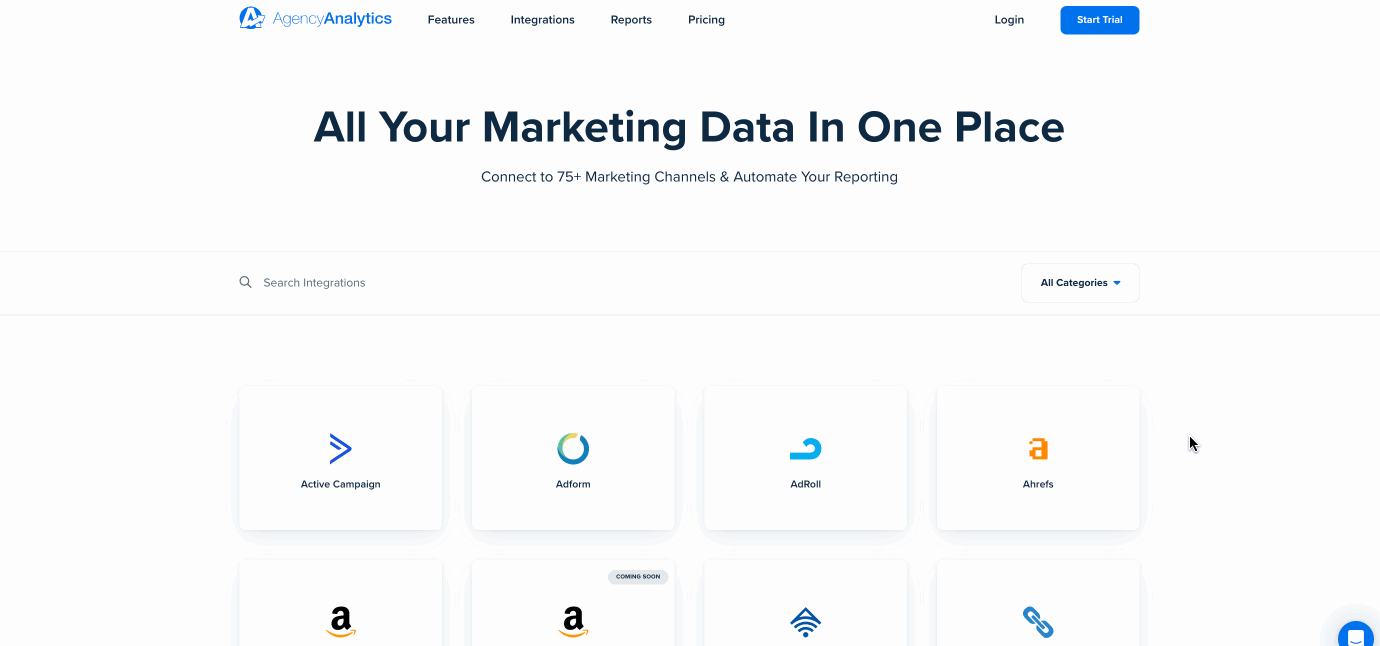
And remember, brand new marketing tools are always popping onto the scene. A great analytics platform should continually be adding to their list of integration options. Bonus points if they give you alternate options for pulling in custom data and data from lesser known platforms, even if it doesn’t yet integrate with them directly.
Need something that goes beyond the ordinary? The best marketing analytics tools include data connectors like Google Sheets, Google Big Query, MySQL, and Amazon Redshift as a work-around to pull in data from any new or lesser known platforms your clients might be trying out.
Dynamic Analytics
To be useful in any way, data needs to be reliably accurate, first and foremost.
When data is pulled through API, a bit of a time lag can be unavoidable. But the right marketing analytics platform for your agency will consistently provide all the integration data your team needs in near-real time to support effective client reporting.
AgencyAnalytics is a game-changing platform that simplifies data management and analysis for our clients. The platform excels at presenting key performance indicators (KPIs) from various departments, allowing clients to conveniently monitor and track their progress from a single, unified dashboard.
Alexa Rees, SEO Manager, seoplus+
Importance of Timely Data in Decision-Making
Timely data is crucial in decision-making for your agency because it ensures the choices and actions you make are based on the most current and relevant information. Outdated data, or data that restricts you to only looking at a brief snapshot in time, leads to ineffective or even counterproductive decisions.
Quick access to fresh data lets you respond in real-time to emerging trends, challenges, and opportunities. And being able to look back at historic data helps you understand past trends that may be repeated. This capability encourages more effective strategies and a competitive advantage for your agency.
Support for the Right Data
While all marketing analytics platforms rely on native platforms’ API to pull metrics for tracking and reporting purposes, some native platforms make more data points available than others.
The platform you select should be receptive to expanding the data point offerings in their integrations to meet your agency’s specific needs. This isn’t always possible due to the API limitations of some native platforms, but at the very least, the platform you opt for should be responsive to these kinds of requests.
For example, agencies that use AgencyAnalytics can easily submit requests and feedback for improving the platform—anything from adding one new integration metric to building out an entire new feature. These submissions, which can also be upvoted by other users, are monitored and reviewed by the product team to ensure the platform is continually evolving to meet the real-life needs of users.
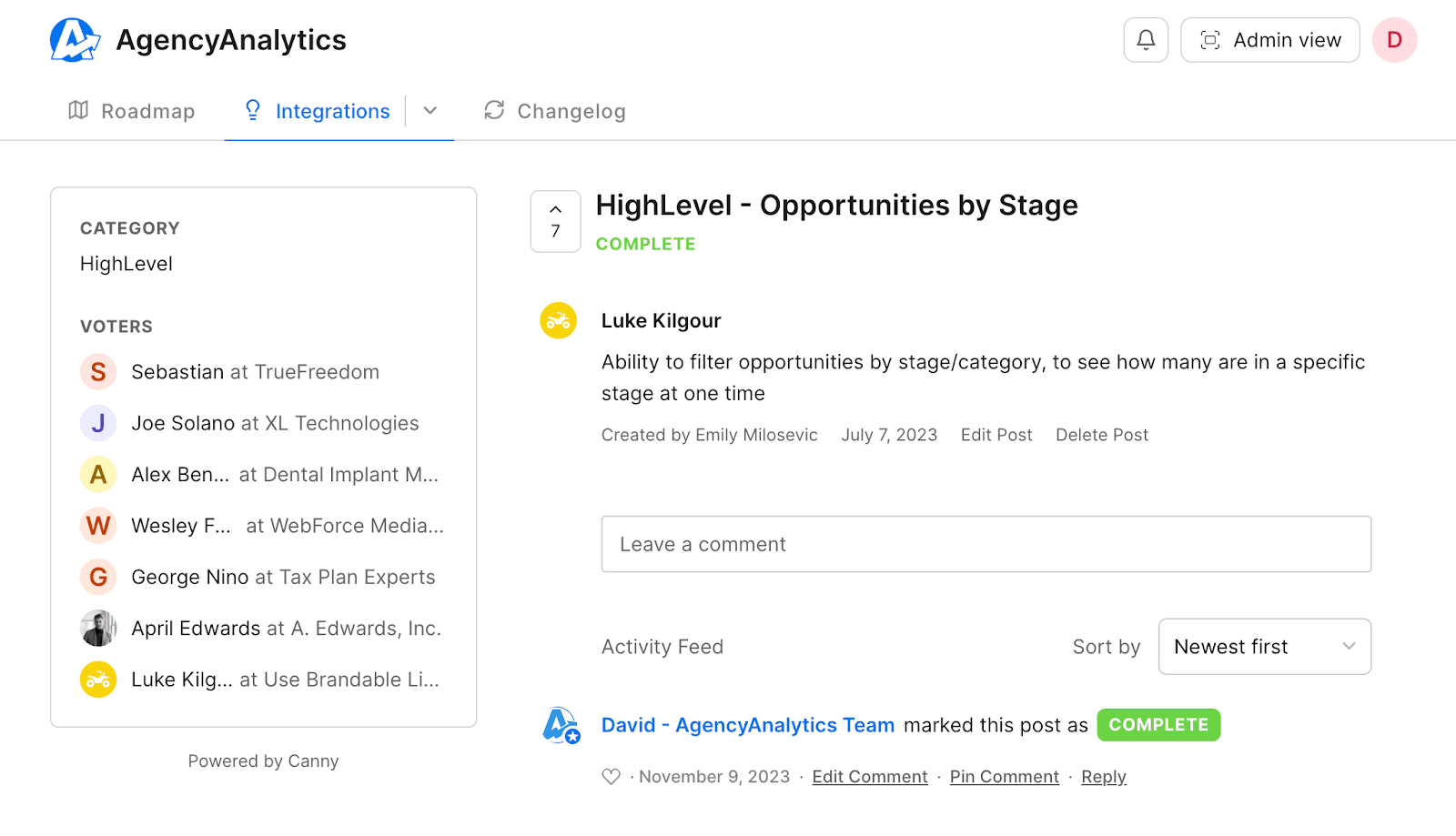
User-Friendly Interface
The marketing analytics platform you select for your agency should be user-friendly. After all, you want your team to get in there and start finding value in as little time as possible.
Why an Intuitive Interface Matters
Choosing a marketing analytics platform that’s highly intuitive leads to quicker adoption, fewer errors, and higher productivity. You want your agency’s team members to be able to navigate the software and use its features effectively right from the start.
The design should be clean and the workflows need to make sense for what your agency is trying to accomplish. And it never hurts if responsive live support is just a quick away!
One of the most important reasons I’m with AgencyAnalytics instead of the competitors is because of their quick and friendly customer service.
Carlos Espitia, Chief Marketing Strategist, CAE Marketing Group
Impact on Team Efficiency
When you’re testing out platform options, include more than one team member in the process. Not only do you want to see how intuitive it is from various user perspectives, but you also want to make sure the software meets the functional needs of different roles within your agency. Is the solution going to efficiently address the problems your agency set out to solve in the first place?
Between ease of use, user interface, configuration, and customer support, AgencyAnalytics is the industry gold standard in reporting software. We’ll be customers for life!
Dan Delmain, Owner, :Delmain
In short, an intuitive interface matters because it not only creates efficiency and enhances the user experience, but also reduces the time to value—for your team and your clients!
Comprehensive Client Reporting Features
Using marketing analytics to create smart strategies that effectively drive marketing performance is a win. But your team also needs to be able to report on your performance to your clients.
So what do clients care about? They want marketing performance data delivered to them in a way that’s easy to access and simple to digest. Make it clear, keep it uncomplicated, and of course, the data should always be reliable and relevant. Delivering client reports that check all of these boxes builds trust and strong client relationships.
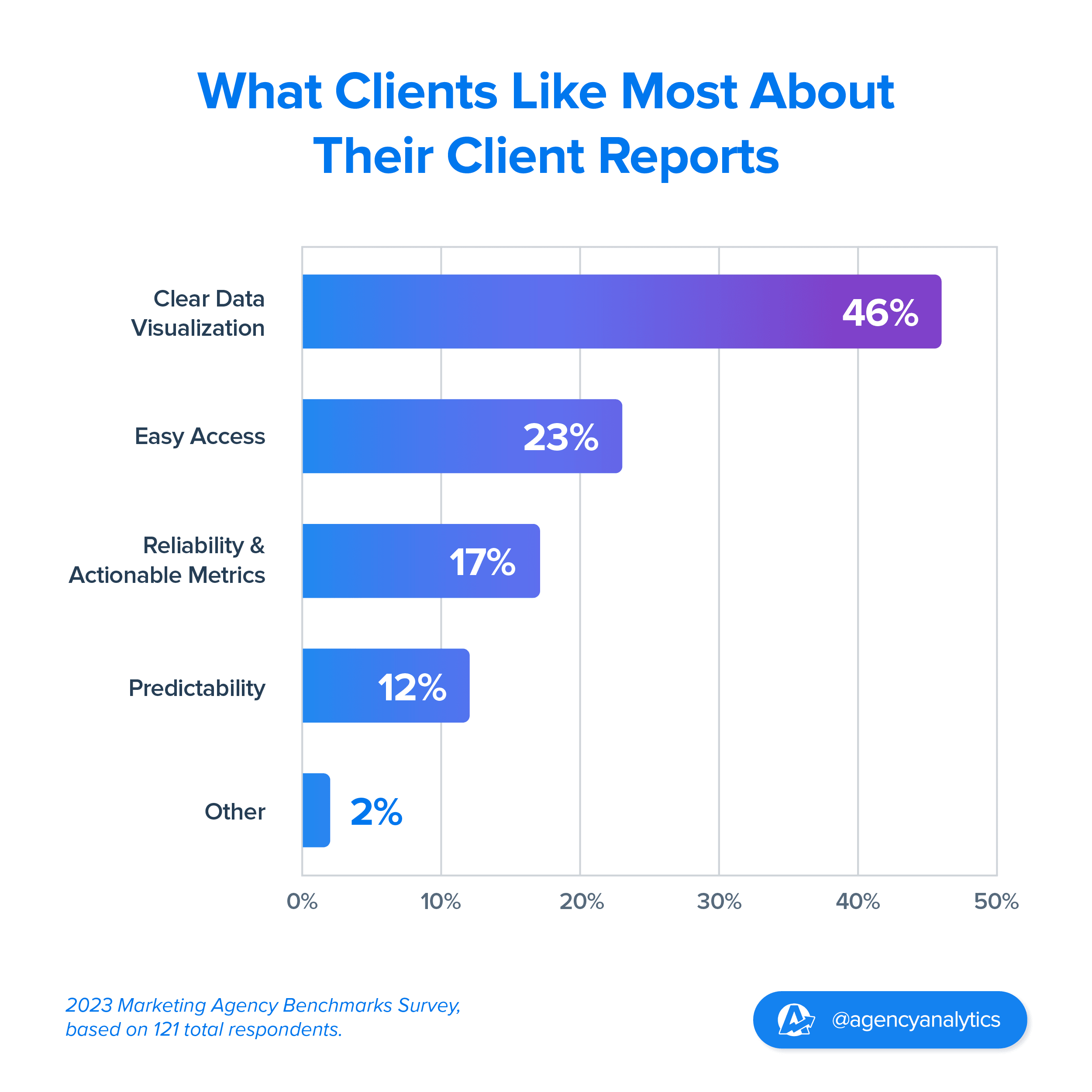
These are the reporting features that are going to matter most to your agency and your clients.
Automated Reports
Clients need to see the value your agency delivers month after month to justify their spend. But the process of putting reports together—from switching between platforms for data to cobbling together something that effectively illustrates how your efforts are impacting your client’s business—is extremely manual and time consuming without the right tools.
Your agency needs report automation. Build the perfect report for your client from scratch, clone that report to use again, or even turn it into a template for a completely repeatable reporting process. AgencyAnalytics, for example, even offers Smart Reports—a feature that lets you create ready-to-send reports in 11 seconds or less.
Customizable Analytics Dashboards
Dashboards that combine key analytics from across your client’s marketing channels are another core feature for telling the story of your client’s performance—and your agency’s efforts toward making that happen.
The reason that got us excited about AgencyAnalytics is that within 15 minutes of starting our free trial we were able to complete a full client report. AgencyAnalytics is unique in that it has both dashboards and reports, whereas a lot of other platforms just have one or the other. Also, the report wizard you have is amazing!
Mark Lennon, Managing Partner, Espresso B2B Marketing
Dashboards should be easy to customize based on your agency’s strategy, the unique needs of your clients, and the goals you’re collectively trying to achieve. And whether it’s a tool you just want to use for internal monitoring and insight digging at your agency, or if you’d like to give your clients on-demand access as well, the ability to establish access permissions is key.
Drag and Drop Editing
Creating and editing reports and dashboards for your clients should be simple. Look for quick drag and drop editing functionality that lets you design reports exactly how you like.
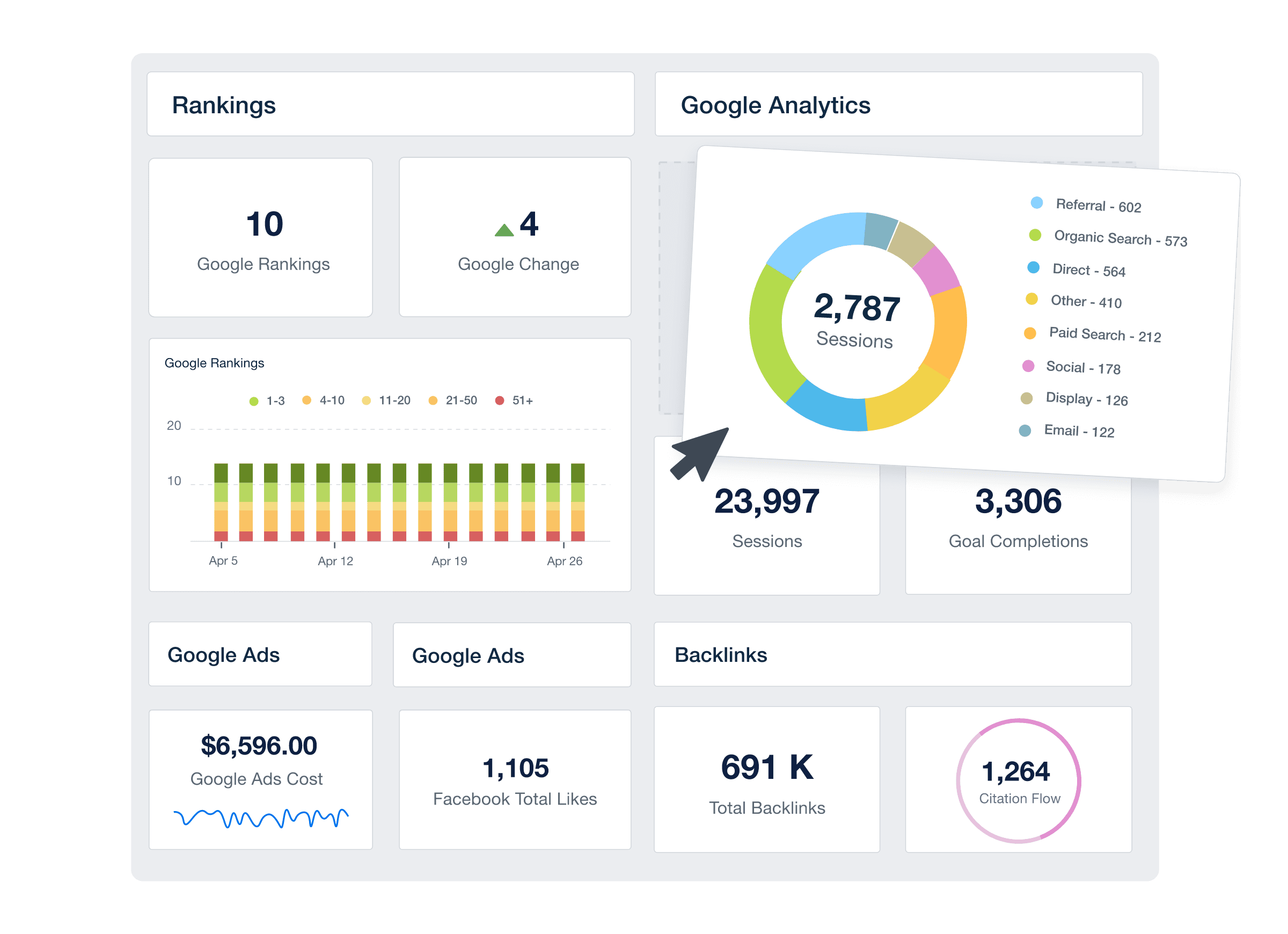
Data might be king, but functionality and great aesthetics are important too!
White Labeling
Carrying your agency’s branding into everything that’s client-facing—including dashboards and reports—adds polish and professionalism to the experience you provide.
Your marketing analytics platform should make it simple for you to offer white labeled reports and dashboards enhanced with your agency’s logo, colors, and more. Build trust in your agency and leave a lasting visual impact.
Custom Metrics
While there’s a wealth of useful marketing analytics available directly through native integrations, the ability to blend metrics and create custom data stories really takes your reporting to a new level.
For example, you might be tracking impressions for your client across a number of different platforms like Facebook, Instagram, and LinkedIn. Obviously you could add them together to get the total impressions—but why not make it easier? And this is just a simple example.
The ability to create custom metrics lets you take standard single-source metrics and blend them together to get entirely new, custom metrics to help your agency tell a more complete story of how you’re driving your client’s performance.
Goals
The ability to set and track goals over time is another crucial reporting feature that really enhances your agency’s ability to prove value to your clients.
Whether the goal is to increase website traffic, earn a certain number of impressions or engagements, or drive a set number of conversions, your reporting solution should offer the ability to be completely transparent with your client in terms of the progress.
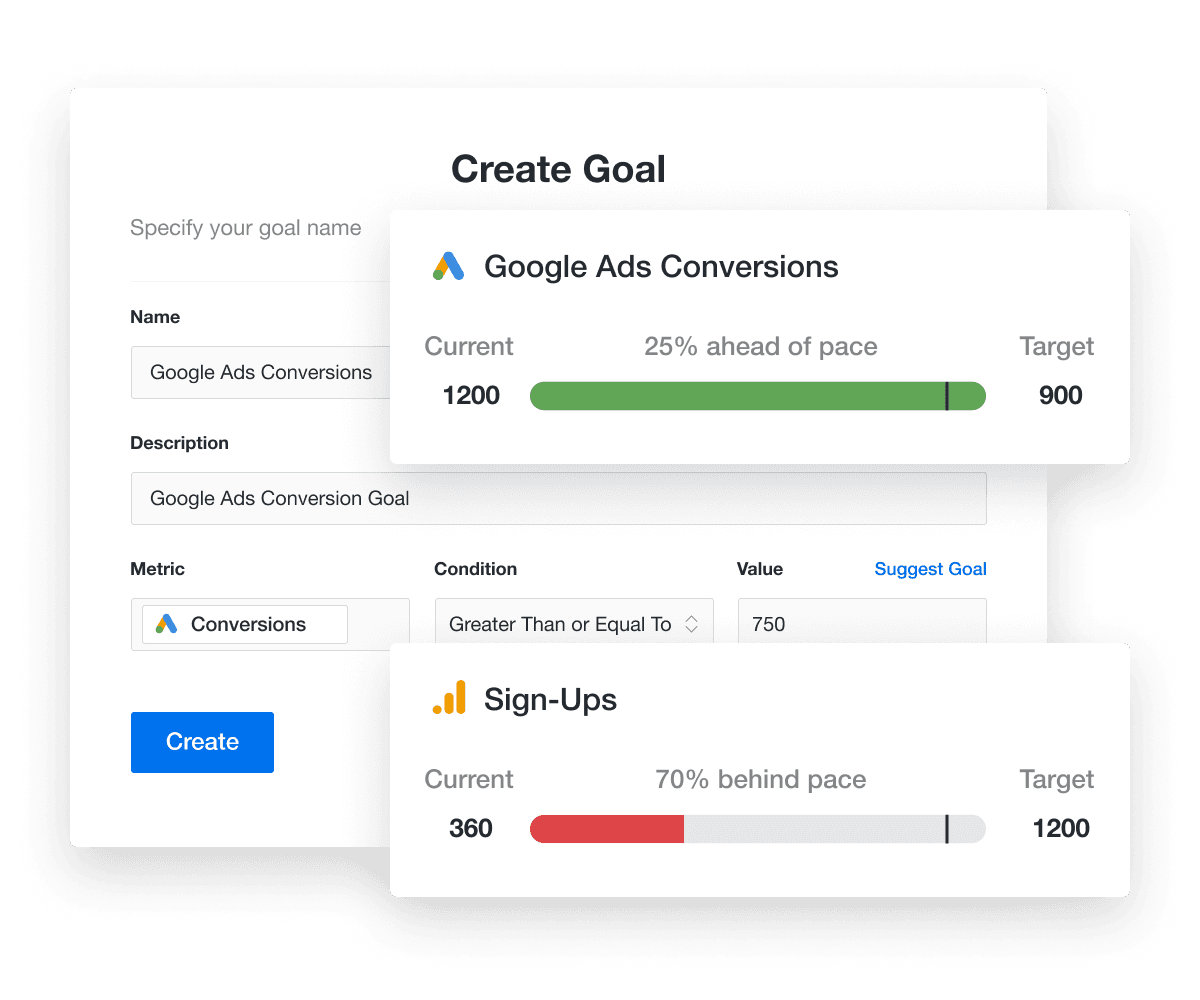
Automation
Once you’ve created the ideal report for your client—including all the relevant metrics across their key channels, custom metrics to deepen the data story, and clear goals to show them your agency is on track—you need the ability to get that report into their hands.
The right marketing analytics platform should make it simple for you to set your finished reports to send on whatever schedule you’ve agreed on with your clients. The data should update automatically and give your client consistent, reliable reports that prove your agency’s impact.
Bonus: Look for an approval feature. This gives you an opportunity to add a final layer of insight and oversight before that report gets in front of your client.
Customization and Scalability
You have specific and unique ways of running your agency, and you shouldn’t have to compromise on that. Seek a solution that’s not only customizable to meet your needs, but also scalable to keep up with your growth.
Why Customization Is Necessary
Being locked into rigid templates and workflows goes against the creative nature of the marketing industry. The analytics platform you choose should offer customization potential across the board.
From the data you select to include, to the editing and scheduling of your client reporting, and even the user permissions in the software as a whole, customization is key to really making the platform your own.
The Importance of Scalable Solutions
You’re not going through this process of picking a platform just so you can do it all over again next year when you double your client base. Your agency needs a solution that will scale right along with you.
You need to be able to add as many new clients as your team can handle with zero concern for data capacity. And if your team also doubles in the next year? The platform needs to support staff user growth as well.
Custom permission settings, task management capabilities, client messaging integrations, and account-level performance monitoring are just some of the features and functionalities that make a marketing analytics platform suited to scaling agencies.
Security Measures
Your marketing agency can’t ignore the importance of responsibly managing sensitive client information. It's crucial to understand the basics of data security in client interactions and the significance of establishing user permissions to regulate access to data.
Data Protection Considerations
As you’re exploring options for a marketing analytics platform, take the time to read through each company’s privacy policy. From information collection and usage to the use, retention, and security of data, it pays to read the fine print.
Customizing User Permissions to Control Data Access
Controlling who has access to which data is another important consideration. Ensuring the platform you choose has proper access customization capability is as crucial as the security measures implemented for data protection.
You want the ability to establish user permissions in a granular way, taking into account the roles within your agency and the particular requirements of your clients.
For example, your account managers don’t necessarily require access to data for all your clients—just the ones they manage. And on the client end, only designated team members should have permission to view and modify certain dashboards and reports.
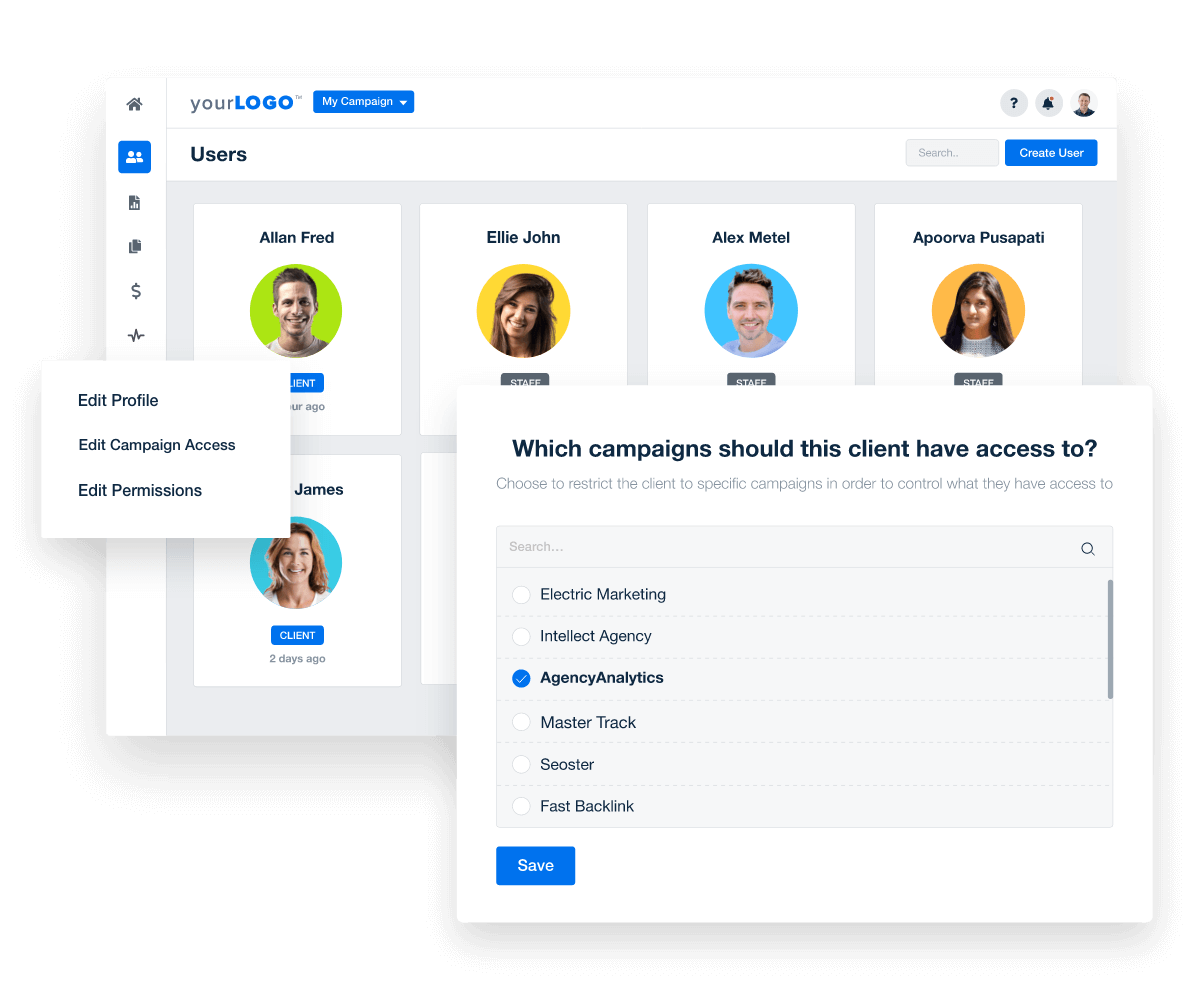
We want to be totally transparent with our clients, and AgencyAnalytics allows us to provide our clients with a live dashboard where they can have full insight into what we're doing without needing to give full access to the ad platforms where they would have the potential to interfere with performance.
Michael Wisby, CEO, Two Trees PPC
Cost vs. Value
Pricing can be a tough thing to wrap your head around when you’re comparing marketing analytics platforms. While you don’t want to over pay, you also want to get your agency on a plan that gives you the value you need now while leaving room to grow.
Understanding Pricing Models
You’re going to notice differences in the ways analytics platform providers price their solutions. Some charge by the integrations, others by the number of reports you generate or the number of clients you support.
Make sure you understand the cost based on your agency’s needs now as well as how each usage-based model will scale as you grow. You don’t ever want a pricing model that will make you feel restricted in your day-to-day reporting.
Calculating ROI for Your Business
The returns on your agency’s investment into a marketing analytics platform will be both quantitative and qualitative.
For example, the time your team members save by working with just one platform instead of jumping between many and leveraging automated client reporting instead of manually compiling them is quantifiable in itself and in terms of salaried time.
Time is a precious commodity and when you get someone back time, everyone wins, including the client, the company, and the individual.
Dan Delmain, Owner, :Delmain
Other returns will be more qualitative, like the trust you build with clients when they start receiving clear, consistent, visually engaging reports that spell out the value your agency delivers.
Questions To Ask Software Companies
When you’re researching marketing analytics platforms, it’s smart to come to the table with a list of important questions to explore for each solution provider.
Of course, you’ll have questions specific to your agency’s unique interests and requirements, but here’s a core list to get you started.
What Kind of Support Is Available?
Issues are going to arise at some point or another, even with the best software solutions out there. Whether you encounter a bug in the software or are simply experiencing user error, how is the company going to address and support your team through any potential challenges?
Dig into their email and live support offerings. You want to make sure help is there when you need it. Make sure the platform you pick has a support team with a great track record of responding quickly to customers challenges and concerns—regardless of language and timezone.
It’s also useful to read reviews and see what others are saying about their support experience with a given software company. It’s one thing to hear promises from a company about their excellent customer support. It’s a whole other thing when you get to hear it straight from real people using the platform.
What Kind of Training Resources Do You Offer?
Every new software is going to have a learning curve. What kinds of resources are available to help your team get up to speed, learn about cool features and functionality, and perhaps quickly troubleshoot any issues they encounter all on their own?
Articles, product videos, and webinars should be available to cater to the various needs and learning styles of your team members. And if your agency is large enough, you might even look for a fully white-glove onboarding experience to make training, onboarding, and data transfer a breeze.
How Often Are Updates and New Features Released?
You want a marketing analytics platform that’s innovative, future-focused, and developing in a direction that aligns with your agency’s goals.
Where can you go to learn about exciting new features in the platform, and how often can you expect to see them released?
You should also ask how the company handles any feature requests your agency might have along the way. Make sure they’re listening to their customers and considering their needs as they move along their development roadmap.
What Happens if You Sign Up With a Platform and Then Change Your Mind?
Signing up for a free trial is an obvious starting point to make sure a marketing analytics platform suits your agency’s needs. Even better if it’s free and doesn’t require a credit card to sign up.
But also find out what happens if you sign up and change your mind—especially if you’re keen on choosing an annual plan.
The right platform should guarantee you’re satisfied.
Key Takeaways for Evaluating a Platform
Making that final decision when exploring marketing analytics software options is never easy. But by working through an evaluation process that balances your agency’s specific needs, budget, and the features offered by different solutions on the market, you’ll feel confident in landing on the best options for your agency.
A Checklist for Making Your Final Decision
Define Your Objectives | Clearly outline what you want to achieve with a marketing analytics platform. Are you looking to dive deeper into your clients’ campaign performance, speed up and add more polish to your client reporting, better manage your agency’s processes and workflows, or a combination of these? |
Create a Shortlist | Based on your needs and objectives, research and create a list of potential marketing analytics tools that seem to fit. |
Compare Features | Look at the specific features of each tool. Consider the selection of integrations, reliability of data, reporting features, customer support, and any unique features that stand out. |
Check Reviews and References | Seek out reviews and testimonials from people using the platforms—especially those with similar sized agencies. Are they happy with their decision? |
Consider Scalability | Is the platform able to grow with your agency? It should have no problem accommodating more clients and more data. It should also be innovating and evolving to support new marketing strategies. |
Free Trials | Take companies up on their free trials! These give you hands-on experience that’s invaluable for understanding how each tool fits into your agency’s workflow. |
Cost-Benefit Analysis | Once you’ve narrowed down your options, do a cost-benefit analysis for each. Affordability is important, but the cheapest solution may not always be the most cost-effective in the long run. |
Make a Decision | Trust the process. Once you’ve done your research, choose the tool that best aligns with your agency’s objectives, offers the most valuable features for your needs, and fits within your budget. |
Once you've made your decision, start planning how you’re going to fold your new marketing analytics platform into your agency’s current system, and ensure your team is trained and ready to hit the ground running.
Remember, the best choice will depend on your agency’s specific marketing needs, the size of your business, and of course, your budget. Choose a platform that not only meets your current needs but can also grow and adapt with your agency and your clients.
Is AgencyAnalytics the Right Choice for You?
There’s no getting around it—we’re a bit biased when it comes to this topic. But here are some parting words on why we think AgencyAnalytics is 100% the right choice to help your digital agency scale.
With a customer base of 7,000+ agencies and counting, AgencyAnalytics is the only marketing analytics platform on the market purpose built for marketing agencies. That means every feature and functionality built into the software targets the unique needs of agencies serving clients.
Here’s just a snapshot of what AgencyAnalytics brings to the table:
80+ integrations backed by a team of developers focused solely on getting you the data you need to report for your clients.
Intuitive, user-friendly interface that makes it simple for your team to navigate and do the jobs that need to be done on the platform, with ease.
Smart report automation to save your agency up to hundreds of hours every single month on client reporting—what will your team of experts do with all the extra time?
Customization features like advanced white labeling, user permissions, trackable goals, and custom metrics to enhance your reports and make your agency’s value undeniable.
Scalability and security to grow your agency, no matter how many clients or team members you bring on.
Dedicated customer support with email and 24/5 live chat, not to mention a Help Center chock full of articles and video tutorials to help you excel with the platform.
But as they say, don’t take our word for it. Try it for yourself and choose the right marketing analytics platform to help your agency keep on thriving!

Written by
Daniella is a product marketing manager with more than a decade of experience in strategic digital communication and story-telling. She specializes in helping B2B SaaS businesses grow and thrive.
Read more posts by Daniella IngraoSee how 7,000+ marketing agencies help clients win
Free 14-day trial. No credit card required.



